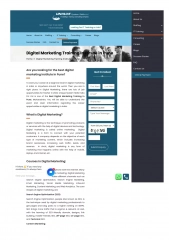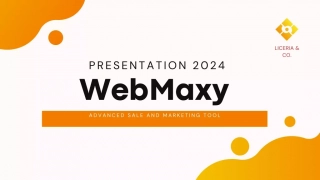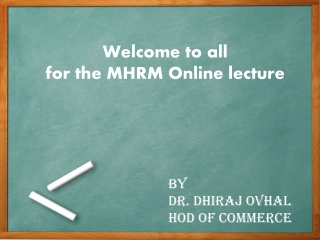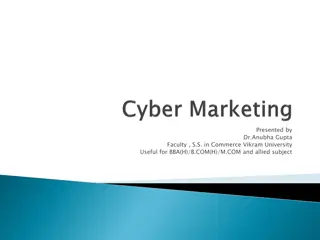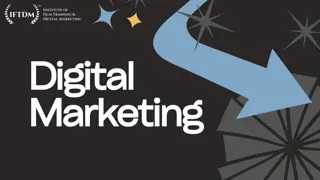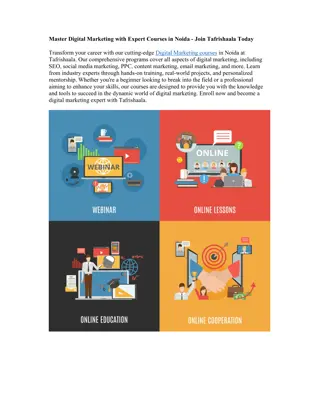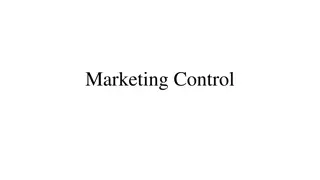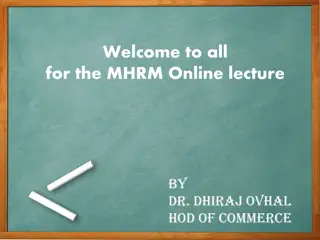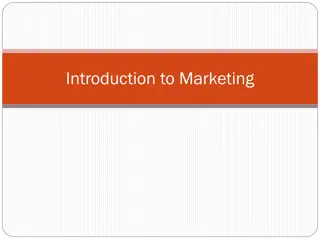Evolution of Marketing: Changes in the Last Decade
Dynamic transformations in the marketing world over the past decade, from the historical roots to the pivotal role in goods transfer and standard of living. Discover the significant shifts and trends shaping the marketing landscape, including consumer behavior and technological advancements.
Download Presentation

Please find below an Image/Link to download the presentation.
The content on the website is provided AS IS for your information and personal use only. It may not be sold, licensed, or shared on other websites without obtaining consent from the author.If you encounter any issues during the download, it is possible that the publisher has removed the file from their server.
You are allowed to download the files provided on this website for personal or commercial use, subject to the condition that they are used lawfully. All files are the property of their respective owners.
The content on the website is provided AS IS for your information and personal use only. It may not be sold, licensed, or shared on other websites without obtaining consent from the author.
E N D
Presentation Transcript
1 Recovery and Social Perspectives in Approved Mental Health Professional (AMHP) Practice Dr Tony Sparkes & Dr Kate Karban University of Bradford Recovery Resesarch Network Meeting November 2019
Objectives 2 Setting the scene Conceptual background Outline of the study To share the findings of our study Reflections on the potential challenges and opportunities when applying social perspectives and recovery in AMHP practice. Recovery Resesarch Network Meeting November 2019
Recovery in the context of marginalised communities 3 Mental health is shaped by the wide-ranging characteristics of the social, economic and physical environments in which people live (Elliot, 2016:7) and those most in need of services suffer most (Cummins, 2018:3). Greater inequality is associated with higher rates of mental illness, especially depression (Wilkinson & Pickett, 2017; Patel et al, 2018) In the case of psychotic disorders the prevalence among the lowest quintile of household income is nine times higher than in the highest. (Marmot Review, 2010) Recovery Resesarch Network Meeting November 2019
4 People at greater risk of developing mental health difficulties includes those with past mental health problems; homeless; people with history of violence or abuse; adults who misuse alcohol or other substances; offenders and ex-offenders; LGBT adults; Travellers, asylum seekers and refugees; those with a history of being looked after or adopted; people with learning disabilities; isolated older people; and people from BAME communities (Elliot, 2016: 8) Recovery Resesarch Network Meeting November 2019
increasing pressures but fewer resources 5 Increasing number of MHA detentions with 40,988 detentions recorded in 2018-19 . Estimated increase of 2% over previous year. (NHS Digital 2019) This includes continuing higher rate of detentions for Black & Black British group over 4x that of White group reduction in number of AMHPs (DHSC,2019); concerns regarding quality and safety of care on wards (CQC,2019) and deteriorating standards, especially in independent hospitals and a shortage of mental health nurses (Kings Fund,2019) Recovery Resesarch Network Meeting November 2019
The professional context 6 National Plan for AMHP workforce Social Work for Better Mental Health Social Work England AMHP role and practice AMHP research including practitioner research Review of the Mental Health Act Recovery Resesarch Network Meeting November 2019
Mental Health Act Code of Practice 7 Promoting independence & recovery (MHA CoP, 2015:22) The role of AMHP in providing an independent decision about whether or not there are alternatives to detention under the Act, bringing a social perspective to bear on their decision (MHA CoP, 2015:122) Recovery Resesarch Network Meeting November 2019
Rationale for the study 8 There is little empirical work to indicate how recovery & social perspectives are accounted for in routine AMHP practice. The study addressed the question of how AMHPs make sense of recovery & social perspectives when undertaking Mental Health Act assessments. The aim was to make a positive contribution to better informed learning and teaching, & to drive up standards for all who come into contact with the AMHP role, including assessments under the Mental Health Act Recovery Resesarch Network Meeting November 2019
Methodology 9 Qualitative approach Participants: Purposive sample of practicing AMHPs (n=12: 2m & 10f) who qualified between 2012-2016 Semi-structured, 1:1 interviews Audio-recorded and transcribed verbatim Thematic analysis Research ethical approval granted by the University Recovery Resesarch Network Meeting November 2019
A feel for the data... 10 General points about the interviews: Recovery and social perspectives Positive engagement with the study Breadth and depth ( thick ) Passion, integrity and humanity Coherence and articulation Professional development Autonomy and confidence Innovation Recovery Resesarch Network Meeting November 2019
A social perspective: what do we mean? 11 Tew s cornerstones for practice (2005:217): Exploring lived experience & situated knowledge through dialogue A holistic lens, person in context, sensitive to adversity, challenging experiences; recognising strengths & resources Recognising power & powerlessness, including experience, the effects of stigma & discrimination Identifying strategies for increasing social capital & inclusion, across individual, social & community networks Action planning avoiding the language of treatment or care Recovery Resesarch Network Meeting November 2019
Recovery: what do we mean? 12 is a way of living a satisfying, hopeful and contributing life even with limitations caused by the illness. Recovery involves the development of new meaning and purpose in one s life (Anthony 1993) Connectedness Hope and optimism Identity Meaning in life Empowerment Task 1: Developing a positive identity Task 2: Framing the mental illness Task 3: Self-managing the mental illness Task 4: Developing valued social roles Leamy et al (2011) Slade (2013) Recovery Resesarch Network Meeting November 2019
The social side of things Experiences of trauma & abuse SOCIAL PERSPECTIVE Iatrogenic harm The process of the assessment Recovery Resesarch Network Meeting November 2019 13
Speaking position & professional identity Meaning and sense- making Recovery Process or event Language Recovery Resesarch Network Meeting November 2019 14
Recovery 15 For some participants: Speaking position and professional identity: accounting for recovery contingent upon role (SW or AMHP) Tensions are not necessarily binary, but dynamic, and have an influence upon the expression of professional values In context of the AMHP role, wriggle-room and sense- making: MHAA as an event MHAA as a process Recovery Resesarch Network Meeting November 2019
Risky business 16 Compulsion during crisis is acceptable, if other options have been exhausted. A recovery-oriented approach to crisis aims to: prevent unnecessary crises minimise the loss of personal responsibility during crisis support identity in and beyond the crisis (Slade 2013:31,32) Recovery Resesarch Network Meeting November 2019
Final thoughts 17 The role of speaking positions in ruling in and ruling out what can be spoken about in AMHP practice Mental Health Act assessment as event or process AMHPs and artful practice Opportunities for preventative work, including recommendations for the future. Pressures: time / resources / dominance of medical model Organisational arrangements for AMHP work may facilitate or limit pre / post involvement Recovery Resesarch Network Meeting November 2019
18 Questions? Tony Sparkes: A.Sparkes@bradford.ac.uk Kate Karban: k.karban@bradford.ac.uk Recovery Resesarch Network Meeting November 2019
Key references 19 Anthony, W. (1993) Recovery from mental illness: the guiding vision of the mental health service system in the 1990s. Psychosocial Rehabilitation Journal. 16(4) 11-23 Care Quality Commission (2018) Mental Health Act Approved Mental Health Professional services. Care Quality Commission CQC (2019) The state of health care and adult social care in England 2018/19 https://www.cqc.org.uk/publications/major- report/state-care Cummins, I. (2018) The Impact of Austerity on Mental Health Service Provision: A UK Perspective Int. J. Environ. Res. Public Health, 15(6), 1145; https://doi.org/10.3390/ijerph15061145 Department of Health (2015) Mental Health Act 1983: Code of Practice. The Stationary Office Department of Health (2016) Social Work for Better Mental Health: A Strategic Statement. https://www.gov.uk/government/publications/social-work-improving-adult-mental-health Department of Health and Social Care (2018) Modernising the Mental Health Act - Final report of the Independent Review of the Mental Health Act 1983 https://www.gov.uk/government/publications/modernising-the-mental-health-act-final-report-from-the- independent-review Department of Health and Social Care (2019) Chief Social Worker for Adults' annual report: 2018 to 2019 social work leadership in changing times https://www.gov.uk/government/publications/chief-social-worker-for-adults-annual-report-2018-to- 2019 Department of Health and Social Care (2019) DHSC(2019) National Workforce Plan for Approved Mental Health Professionals (AMHPs) https://www.gov.uk/government/publications/national-workforce-plan-for-approved-mental-health-professionals-amhps Recovery Resesarch Network Meeting November 2019
Key references 20 Elliott, I. (2016) Poverty and Mental Health: A review to inform the Joseph Rowntree Foundation s Anti-Poverty Strategy. London: Mental Health Foundation. Kings Fund(2019) Mental Health Position Statement Https://www.kingsfund.org.uk/projects/positions/mental-health Leamy, M., Bird, V., Le Boutillier, C., Williams, J. and Slade, M. (2011) Conceptual Framework for Personal Recovery in Mental Health: Systematic Review and Narrative Synthesis. The British Journal of Psychiatry. 199(6), 445-452. Marmot, M. (2010) Fair Society, Healthy Lives: Strategic Review of Health Inequalities in England post 2010, The Marmot Review NHS Digital(2019) Mental Health Act Statistics, Annual Figures. England, 2018-19 https://digital.nhs.uk/data-and- information/publications/statistical/mental-health-act-statistics-annual-figures/2018-19-annual-figures#resources Patel, V., Burns, J., Dhingra, M., Tarver, L., Brandon, A. & Crick, L.(2018)Income inequality and depression: a systematic review and meta analysis of the association and a scoping review of mechanisms, World Psychiatry, 2018 Feb; 17(1): 76 89. Slade, M. (2013) 100 ways to support recovery: a guide for mental health professionals (2nd ed.) Rethink Mental Illness. Tew, J. (ed) (2005) Social perspectives in mental health. Jessica Kingsley Press The Mental Health Act (1983) The Mental Health (amendment) Act 2007 Wilkinson, R. & Pickett, K. (2017) The enemy between us: The psychological and social costs of inequality, The European Journal of Social Psychology, First published: 22 May 2017, https://doi.org/10.1002/ejsp.2275 , Recovery Resesarch Network Meeting November 2019




